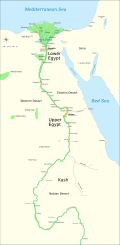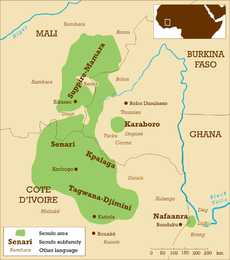Portal:Africa



Africa is the world's second-largest and second-most populous continent after Asia. At about 30.3 million km2 (11.7 million square miles) including adjacent islands, it covers 20% of Earth's land area and 6% of its total surface area. With nearly 1.4 billion people as of 2021, it accounts for about 18% of the world's human population. Africa's population is the youngest among all the continents; the median age in 2012 was 19.7, when the worldwide median age was 30.4. Based on 2024 projections, Africa's population will reach 3.8 billion people by 2099. Africa is the least wealthy inhabited continent per capita and second-least wealthy by total wealth, ahead of Oceania. Scholars have attributed this to different factors including geography, climate, corruption, colonialism, the Cold War, and neocolonialism. Despite this low concentration of wealth, recent economic expansion and a large and young population make Africa an important economic market in the broader global context. Africa has a large quantity of natural resources and food resources, including diamonds, sugar, salt, gold, iron, cobalt, uranium, copper, bauxite, silver, petroleum, natural gas, cocoa beans, and.
Africa straddles the equator and the prime meridian. It is the only continent to stretch from the northern temperate to the southern temperate zones. The majority of the continent and its countries are in the Northern Hemisphere, with a substantial portion and a number of countries in the Southern Hemisphere. Most of the continent lies in the tropics, except for a large part of Western Sahara, Algeria, Libya and Egypt, the northern tip of Mauritania, and the entire territories of Morocco and Tunisia, which in turn are located above the tropic of Cancer, in the northern temperate zone. In the other extreme of the continent, southern Namibia, southern Botswana, great parts of South Africa, the entire territories of Lesotho and Eswatini and the southern tips of Mozambique and Madagascar are located below the tropic of Capricorn, in the southern temperate zone.
Africa is highly biodiverse; it is the continent with the largest number of megafauna species, as it was least affected by the extinction of the Pleistocene megafauna. However, Africa also is heavily affected by a wide range of environmental issues, including desertification, deforestation, water scarcity, and pollution. These entrenched environmental concerns are expected to worsen as climate change impacts Africa. The UN Intergovernmental Panel on Climate Change has identified Africa as the continent most vulnerable to climate change.
The history of Africa is long, complex, and varied, and has often been under-appreciated by the global historical community. In African societies the oral word is revered, and they have generally recorded their history via oral tradition, which has led anthropologists to term them oral civilisations, contrasted with literate civilisations which pride the written word. During the colonial period, oral sources were deprecated by European historians, which gave them the impression Africa had no recorded history. African historiography became organized at the academic level in the mid-20th century, and saw a movement towards utilising oral sources in a multidisciplinary approach, culminating in the General History of Africa, edited by specialists from across the continent. (Full article...)
Selected article –
Positive Black Soul (also known as PBS) is a hip hop group based in Dakar, Senegal, one of the first such collectives in the country. Founded in 1989, the group is composed of Didier Sourou Awadi (alias DJ Awadi) and Amadou Barry (alias Doug E. Tee or Duggy-Tee), both of whom had previously been in other hip hop groups. They perform in the English, French, and Wolof languages and use traditional Senegalese instruments as part of their songs. Political and social activism have played important roles in the group since it was founded. (Full article...)
Featured pictures –
Did you know (auto-generated) -

- ... that Michigan defensive end Eyabi Okie, ranked number 3 in the 2018 college football recruiting class, changed his surname from "Anoma" to recognize his mother who lives in Africa?
- ... that Dominion: An Anthology of Speculative Fiction From Africa and the African Diaspora was partly inspired by The 1619 Project?
- ... that American Olympic rugby player Sarah Levy is the great-granddaughter of a Springbok?
- ... that Ralph E. Brock was the first academically trained African-American forester in the United States?
- ... that nursing educator Helen Turner Watson was one of the first African-American women to become a commissioned officer in the United States Navy?
- ... that archaeologists found that Updown Girl, who was buried in England in the 7th century, had a mixture of West African and European DNA?
Categories
Selected biography –
Wangarĩ Maathai (/wænˈɡɑːri mɑːˈðaɪ/; 1 April 1940 – 25 September 2011) was a Kenyan social, environmental, and political activist who founded the Green Belt Movement, an environmental non-governmental organization focused on the planting of trees, environmental conservation, and women's rights. In 2004 she became the first African woman to win the Nobel Peace Prize.
As a beneficiary of the Kennedy Airlift, she studied in the United States, earning a bachelor's degree from Mount St. Scholastica and a master's degree from the University of Pittsburgh. She went on to become the first woman in East and Central Africa to become a Doctor of Philosophy, receiving her Ph.D. from the University of Nairobi in Kenya. In 1984, she got the Right Livelihood Award for "converting the Kenyan ecological debate into mass action for reforestation." Wangari Maathai was an elected member of the Parliament of Kenya and, between January 2003 and November 2005, served as Assistant Minister for Environment and Natural Resources in the government of President Mwai Kibaki. She was an Honorary Councillor of the World Future Council. As an academic and the author of several books, Maathai was not only an activist but also an intellectual who has made significant contributions to thinking about ecology, development, gender, and African cultures and religions. (Full article...)
Selected country –
 |
 |
|

| ||
Benin, officially the Republic of Benin, is a country in Western Africa, formerly known as Dahomey (until 1975). It borders Togo to the west, Nigeria to the east and Burkina Faso and Niger to the north; its short coastline to the south leads to the Bight of Benin. Its capital is Porto Novo, but the seat of government is Cotonou. Its politics takes place in the framework of a presidential representative democratic republic, whereby the President of Benin is both head of state and head of government, and of a multi-party system.
The name "Benin" has no proper connection to Kingdom of Benin (or Benin City). The name Dahomey was changed in 1975 to The People's Republic of Benin, named after the body of water on which the country lies, the Bight of Benin. This name was picked due to its neutrality, since the current political boundaries of Benin encompass over fifty distinct linguistic groups and nearly as many individual ethnic groups. The name Dahomey was the name of the ancient Fon Kingdom, and was determined to be an inappropriate name. (Read more...)
Selected city –

Lomé (UK: /ˈloʊmeɪ/ LOH-may, US: /loʊˈmeɪ/ loh-MAY) is the capital and largest city of Togo. It has an urban population of 837,437 while there were 2,188,376 permanent residents in its metropolitan area as of the 2022 census. Located on the Gulf of Guinea at the southwest corner of the country, with its entire western border along the easternmost edge of Ghana's Volta Region, Lomé is the country's administrative and industrial center, which includes an oil refinery. It is also the country's chief port, from where it exports coffee, cocoa, copra, and oil palm kernels.
Its city limits extends to the border with Ghana, located a few hundred meters west of the city center, to the Ghanaian city of Aflao and the South Ketu district where the city is situated, had 160,756 inhabitants in 2010. The cross-border agglomeration of which Lomé is the centre has about 2 million inhabitants as of 2020. (Full article...)
In the news
- 22 January 2025 – Constitutional crisis in Somalia, Transport in Somalia
- The Somali Airlines Operators Association, representing at least 20 airlines, suspends all flights beginning on January 22, 2025, in protest against increased government-imposed fees after disputes with the Ministry of Aviation and the Somali Civil Aviation Authority. (Shabelle Media) (Hiiraan Online)
- 21 January 2025 – Kivu conflict
- M23 rebels seize the town of Minova in Kalehe Territory, Democratic Republic of the Congo, cutting off a major supply route to the strategic city of Goma. (Reuters)
- 21 January 2025 –
- Four people are injured, one seriously, in a stabbing attack in Tel Aviv, Israel. The Shin Bet confirm that the attacker was a 28-year-old from Morocco, and had permanent residency in the United States. (BBC) (The Times of Israel) (Xinhua)
- Seventeen people are killed and 23 more injured after a collision between a bus and a truck in Ponan-Ouinlo, Ivory Coast. (AP)
- Twenty Ethiopian migrants are killed when their boat capsizes off Yemen after departing from Djibouti, according to the International Organization for Migration. (Al Arabiya)
- 18 January 2025 –
- Ghanian soldiers open fire on illegal miners at a gold mine in Ashanti Region, killing seven people. Ghanian president John Mahama calls for an investigation into the incident. (AP)
Updated: 9:05, 24 January 2025
General images -
Africa topics
More did you know –
- ...that Iyabo Obasanjo-Bello, a Nigerian Senator from the People's Democratic Party, is the daughter of former President Olusegun Obasanjo?
- ...that the 2007 South Africa miners' strike, which impacted over 240,000 workers, was the first ever industry-wide miners' strike in the history of South Africa?
- ...that Seleh Leha, a town in Tigray Region in northern Ethiopia, was the site of a leprosarium built during the Italian occupation of East Africa and abandoned in 1941?
- ...that Sarir field, an oil field in Cyrenaica operated by the Arabian Gulf Oil Company (AGOCO), is considered to be the largest in Libya, with estimated oil reserves of 12 Gbbl (1.9×109 m3)?
Related portals
Major Religions in Africa
North Africa
West Africa
Central Africa
East Africa
Southern Africa
Associated Wikimedia
The following Wikimedia Foundation sister projects provide more on this subject:
-
Commons
Free media repository -
Wikibooks
Free textbooks and manuals -
Wikidata
Free knowledge base -
Wikinews
Free-content news -
Wikiquote
Collection of quotations -
Wikisource
Free-content library -
Wikispecies
Directory of species -
Wikiversity
Free learning tools -
Wikivoyage
Free travel guide -
Wiktionary
Dictionary and thesaurus
























































































